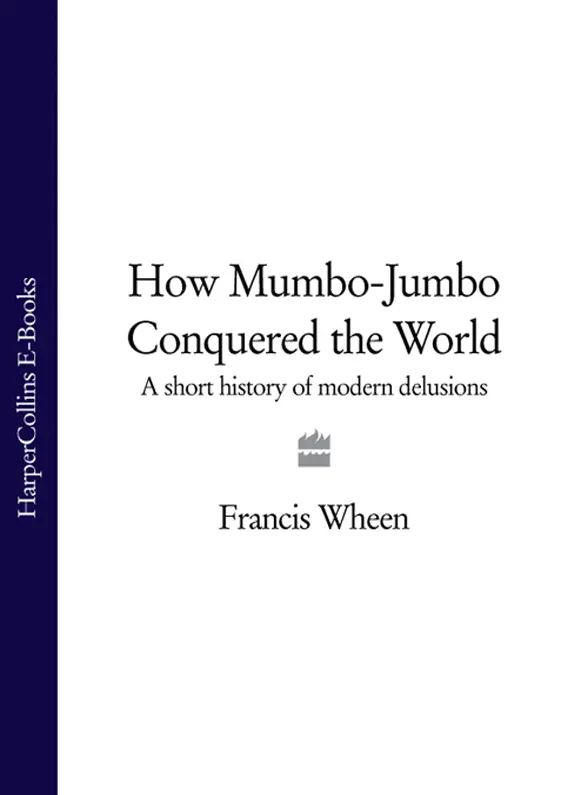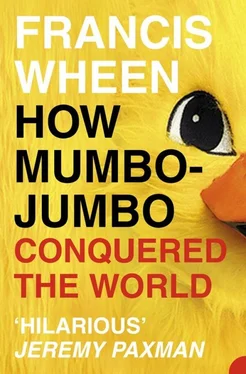
HOW MUMBO-JUMBO CONQUERED THE WORLD
A Short History of Modern Delusions

For Bertie and Archie
Cover
Title Page
Dedication
Prologue: Two Messiahs
Introduction: Dare to Know
1 The voodoo revolution
2 Old snake-oil, new bottles
3 It’s the end of the world as we know it
4 The demolition merchants of reality
5 The catastrophists
6 With God on our side
7 Us and them
8 Candles in the wind
9 Right is the new left
10 Forward to the past
11 Voodoo revisited
P.S. Ideas, Interviews & Features …
About the author
Interview with Francis Wheen
Life at a Glance
Favourite Books
About the book
Mumbo-Jumbo Never Sleeps
Read on
Have You Read?
Francis Wheen’s Guide to the Web
Index
About the Author
Notes
Praise
Copyright
About the Publisher
Tehran, Wednesday 24 January 1979
Three army tanks block the entrance to Mehrabad International Airport, following an announcement by the Shi’ite Muslim leader Ayatollah Ruhollah Khomeini that he intends to return to Iran on 26 January after fourteen years of exile. ‘Khomeini is not coming, not at all,’ a major tells reporters.
It is eight days since Shah Mohammad Reza Pahlavi fled abroad, with mass demonstrations and strikes convulsing the country he has ruled for three decades. The tanks in the roadblock – British-made Chieftains – are themselves symptoms of the malaise which laid him low: both Muslims and Marxists were enraged by his dependence on Britain and the United States, his use of military force to crush dissent and his apparent contempt for Persian traditions.
Shahpour Bakhtiar, the prime minister, said after the Shah’s departure that Khomeini was welcome to return home, but has adamantly refused to accept the Ayatollah’s demand that he should yield power to an Islamic theocracy. As the tanks arrive at the airport, Khomeini’s principal envoy in Tehran, Mehdi Bazargan, holds a news conference at which he describes his old friend Bakhtiar as a ‘reasonable, logical and patriotic man’ who must now accept the inevitable and give way to the Ayatollah. To mollify liberals, socialists and other secular opponents of the Shah, who have become increasingly fearful of Khomeini’s ambitions, he adds that the proposed new government will be called an ‘Islamic Democratic Republic’ rather than merely an ‘Islamic Republic’.
What will it mean in practice? In an interview with the newspaper Ettelaiat the Ayatollah denounces dancing and cinema as unIslamic, and limits his promises of free speech to exclude ‘things not in the national interest’. At the Tehran news conference, Bazargan rejects models such as Libya and Saudi Arabia, explaining that he favours a government like that ‘we had for ten years under the Prophet Mohammed and for five years under the Imam Ali’. In short, the intention is to restore a regime that last existed almost 1,300 years ago.
Monday 29 January
In Tehran, troops open fire on demonstrators who have burned two cinemas, two restaurants, a liquor shop, several bordellos and a nightclub. The protesters are seen ‘chortling with delight’ as they throw champagne bottles from the club’s cellar on to a bonfire.
At the American embassy, Iranian soldiers guarding the grounds have to be replaced after one shoves an assault rifle into an American officer’s belly and yells, ‘Yankee go home!’ As the original sixty-man contingent drive away in trucks, they all shout the same refrain.
Outside Tehran University, where at least thirty-five people were killed by army bullets yesterday, Major-General Taghi Latifi is dragged from his Mercedes 220 and badly beaten. A leaflet distributed on the campus says the time has come to establish a ‘people’s army’ and attack the United States and Israel. ‘We have to get guns,’ it adds. Thousands of students take up the chant: ‘Machine guns, machine guns, the answer to everything.’ On sale inside the university are photographs of the Shah holding a glass of wine and Empress Farah wearing a one-piece swimming suit. Even girls whose blue jeans are visible beneath their ankle-length Muslim robes brandish the photos as proof of the royal couple’s dissolute habits.
Alarmed by the crescendo of violence, Shahpour Bakhtiar announces that the country’s airports will reopen tomorrow. Americans, Europeans and Iranian Jews make plans to leave as soon as possible. At his villa in the Parisian suburb of Neauphle-le-Château, Khomeini issues a statement confirming that he will return within the next forty-eight hours. ‘If there is any blood to be shed, I want to be among my people.’
Thursday 1 February
Accompanied by a retinue of journalists and Iranian students, Khomeini boards a chartered Air France Boeing at Charles de Gaulle airport. Throughout the five-hour flight to Tehran, the black-robed, white-bearded seventy-eight-year-old reclines on a carpet in the first-class compartment. As they enter Iranian airspace, a French reporter asks: ‘What are your emotions after so many years of exile?’ The Ayatollah, who has ignored previous questions, murmurs ‘Hichi’ – the Farsi for ‘nothing’.
Khomeini steps off the plane at 9.30 a.m. to a thunderous reception from at least a million supporters, many of whom have waited all night for a glimpse of their hero. In a brief statement at the airport, he says that ‘final victory’ will come only when ‘all the foreigners are out of the country and uprooted … I beg to God to cut off the hand of all evil foreigners and all their helpers in Iran.’ He is then whisked into a limousine for a triumphal motorcade through the centre of Tehran to the cemetery of Behesht-e-Zahra, where he pays tribute to the hundreds who died in the months of demonstrations against the Shah. From there, he is flown by helicopter to his new revolutionary headquarters, a former girls’ school near the Iranian parliament.
According to the BBC correspondent John Simpson, who travelled from Paris with Khomeini, ‘a millennial frenzy took over the entire country. People wept and shouted and beat their chests in an ecstasy of hope and joy.’ Newspapers publish ecstatic poems which reflect this chiliastic optimism:
The day the Imam returns
No one will tell lies any more
No one will lock the doors of his house;
People will become brothers
Sharing the bread of their joys together
In justice and sincerity.
London, Wednesday 10 January
James Callaghan, the British prime minister, looks tanned and relaxed on his return to England after six days at an international summit in Guadeloupe, where he was photographed swimming with young air-stewardesses during a break from discussing the Soviet nuclear threat. Britain, by contrast, is freezing and paralysed: thousands of lorry-drivers are on strike, most ports and many factories have shut down, all roads into the city of Hull are blockaded by secondary pickets, hundreds of schools have closed for lack of heating oil, supermarkets are running out of food and railway workers have announced that they will begin a national strike next week. And all because of Callaghan’s insistence that no pay rise in the private or public sector shall exceed 5 per cent, at a time when inflation is above 8 per cent.
Читать дальше














